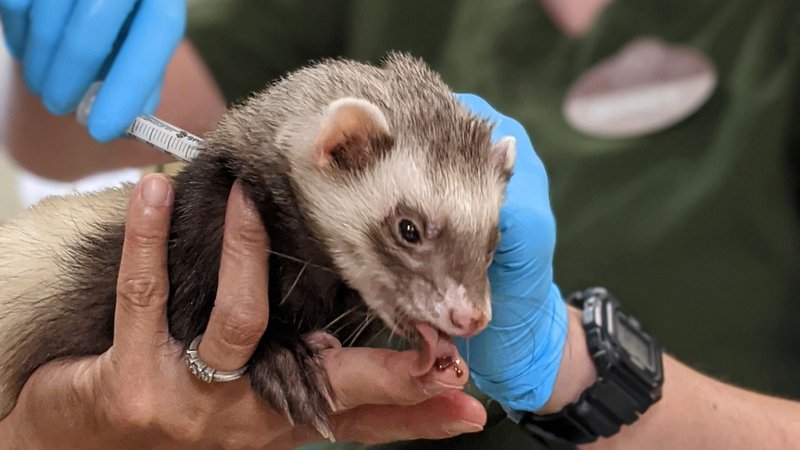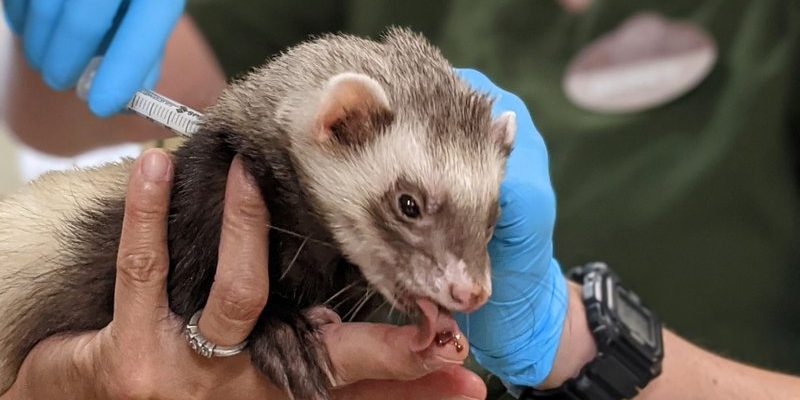
Think of it this way: just as we humans get annual check-ups and vaccinations to stay healthy, our pets need the same kind of care. Ferrets, being a bit more exotic, require specialized knowledge and attention. That’s why understanding the diseases they might face and the vaccines available is crucial for any ferret owner. Let’s dive into this topic so you can ensure your ferret lives a long, healthy life.
Understanding Common Ferret Diseases
Ferrets, while delightful companions, can fall victim to various health issues. Knowing the common ferret diseases is the first step in keeping them healthy. Here are some of the most frequent ailments to watch out for:
Adrenal Disease
Adrenal disease is quite common in ferrets, especially as they age. This condition occurs when the adrenal glands produce too many hormones, leading to symptoms like hair loss, itching, and weight loss. You might notice your ferret getting more grumpy or withdrawn, which can be alarming.
Diagnosing adrenal disease usually involves a veterinary exam and possibly blood tests. Treatment may include medications or surgery, depending on the severity of the condition. The good news is that with proper care, many ferrets can live happily and comfortably post-treatment.
Insulinoma
Insulinoma is another serious issue, affecting a ferret’s sugar levels. This tumor of the pancreas causes an overproduction of insulin, leading to dangerously low blood sugar. Symptoms can include lethargy, weakness, and in severe cases, seizures.
If you notice your ferret acting unusually sleepy or unresponsive, it’s essential to visit a vet right away. This condition often requires a careful diet and medication to manage, but early detection can significantly improve your ferret’s quality of life.
Ear Mites
Ear mites are pesky little critters that love to make a home in your ferret’s ears. They can cause irritation, scratching, and even infections. You might spot dark, crumbly debris in their ears or see your ferret shaking its head more than usual.
Treatment usually involves topical medications that a vet can prescribe. Keeping an eye on your ferret’s ears can help catch these problems early, and regular vet check-ups can ensure they stay mite-free!
The Importance of Vaccinations for Ferrets
Now that we’ve talked about some common diseases, let’s discuss why vaccinations are vital for ferrets. Just like humans, these little creatures need protection against specific diseases to keep them safe and healthy.
Distemper Vaccine
One of the most critical vaccines for ferrets is the distemper vaccine. This disease is often fatal, and it spreads rapidly. Symptoms include fever, runny nose, and lethargy. It’s important to get your ferret vaccinated, especially if it interacts with other animals.
The vaccine is usually administered in a series, starting when your ferret is young. Regular booster shots are also necessary, so make sure to keep up with your vet’s recommendations.
Rabies Vaccine
Rabies is a serious disease that can be transmitted from ferrets to humans. While it’s less common in ferrets than some other species, it’s still vital to vaccinate against it. The rabies vaccine is often required by law in many areas, so check your local regulations.
Like the distemper vaccine, the rabies vaccine requires initial doses followed by boosters. Keeping your ferret up-to-date on vaccinations helps protect not just them, but everyone around them, too.
Other Optional Vaccines
Besides the essential vaccines, some vets might recommend additional ones based on exposure risk. For instance, the leptospirosis vaccine could be discussed if your ferret is around wildlife or other pets frequently.
Always consult with your vet about your ferret’s lifestyle and health history when considering vaccines. They can help you decide the best approach for protection.
Signs Your Ferret Needs Veterinary Attention
It’s crucial to know when your ferret might need to see the vet. Early intervention can make all the difference in successful treatment.
Behavior Changes
If your ferret suddenly becomes lethargic, irritable, or hiding more than usual, it might be a sign something’s wrong. Ferrets are typically playful and curious, so any drastic change in behavior can be a red flag.
Pay attention to their eating and drinking habits too. If they stop eating or drinking, that’s another indicator it’s time to see the vet.
Physical Symptoms
Keep an eye out for physical symptoms like diarrhea, vomiting, or unusual lumps. These can indicate various health issues, from infections to tumors. A quick vet visit can help identify the cause and get your ferret back on track.
Persistent Scratching or Grooming
If your ferret is scratching more than usual or over-grooming, it might be dealing with external parasites or allergies. Check their skin for redness or irritation. If you notice these symptoms persisting, it’s time for a vet check-up.
Creating a Health Plan for Your Ferret
The best approach to your ferret’s health is prevention. Here’s how to create a solid health plan:
Regular Vet Visits
Scheduling regular check-ups with your vet is essential. Many ferret ailments can be managed or prevented with consistent veterinary care. Aim for annual visits, but don’t hesitate to go in sooner if you have concerns.
Nutrition and Diet
A healthy diet plays a critical role in your ferret’s well-being. High-quality ferret food is essential, and you should also include fresh water at all times. Consulting with your vet about nutrition can help tailor a diet specific to your ferret’s needs.
Safe Environment
Creating a safe and clean environment is crucial. Make sure your ferret has a comfortable space free from hazards. Regular cleaning of their living area can help prevent diseases and infections.
Just like with any pet, taking care of your ferret involves understanding their health needs. By learning about common ferret diseases and ensuring they receive the right vaccinations, you’re setting your furry friend up for a happy, healthy life.
Remember, being a responsible pet owner means being proactive about health care. Regular vet visits, a proper diet, and keeping an eye on changes in behavior can make all the difference. With love and attention, your ferret can thrive, bringing joy to your life for years to come!

